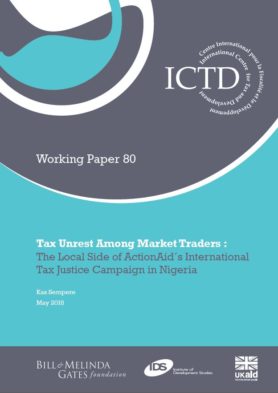ICTD Working Paper 80
Tax justice has become a popular concept, and a number of international tax justice campaigns have exposed aspects such as the unfairness of tax havens and harmful tax breaks. Yet, the idea of tax justice at the local level is less well-known. The impact of campaigns to end tax havens and harmful tax competition may seem far from the lives and day-to-day tax struggles of many people living in poverty, including market traders in the informal sector. ActionAid, an international non-governmental organisation (NGO), managed, not without challenges, to integrate tax claims of market traders – such as multiple taxation – into its international tax justice campaign in Nigeria. Possibly more could have been done to include additional complaints from traders, such as those facing sudden and steep tax increases and tax harassment, and to support their actions – their visits and letters to the government, in addition to their tax strikes. Overall, however, ActionAid succeeded in linking their campaign at the local, national and international levels, retaining relevance at each of these levels by identifying different targets that could be influenced. ActionAid’s work is a positive example for other tax justice campaigns willing to give a stronger voice to market traders. Borrowing some concepts from social movement theory, this paper narrates the campaign’s journey, with a focus on how the market traders’ own tax challenges were integrated. Read the 2-page brief version here.
